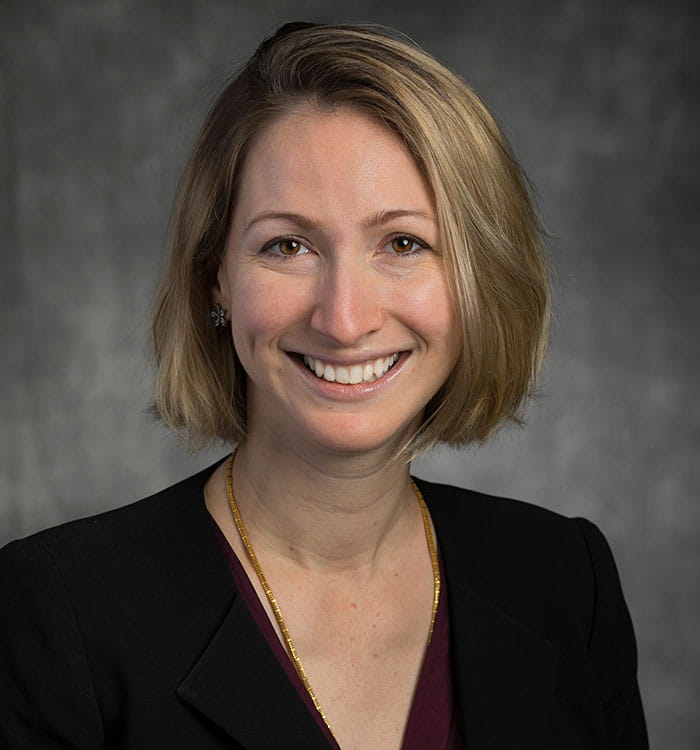New Female Sexual Health Division Addresses Array of Needs
January 20, 2021
1 in 10 women have a diagnosable condition, but many suffer in silence
Innovations in Urology | Winter 2021
 Rachel Pope, MD, MPH
Rachel Pope, MD, MPHWomen with often unaddressed sexual health concerns will now receive multidisciplinary care from experts focused exclusively on their needs through a new division at University Hospitals.
“This has been a long time coming,” says Rachel Pope, MD, MPH, an obstetrician/gynecologist with the Urology Institute at University Hospitals Cleveland Medical Center. “Although many providers at UH in gynecology and urology take care of women with sexual dysfunction, until now, we didn’t have a dedicated program.”
Female sexual dysfunction is more common than diabetes, and one in 10 women have a diagnosable condition. Yet, despite its prevalence, many women are uncomfortable discussing their concerns, even with their primary care provider or gynecologist. So, often they don’t. They endure these conditions silently and it takes over their quality of life.
Dr. Pope says. “There’s an underlying taboo around women’s sexuality and sexual health, an underlying shame or embarrassment. We’re hoping to put this to rest. Although sexual health problems vary widely, the thing they have in common is that people don’t like talking about them publicly and women don’t know where to turn to for help.”
Sexual health is a “door knob question” in healthcare, Dr. Pope says. “A woman comes to the doctor with a vague complaint and as her doctor is leaving at the end of the appointment, she finally says, ‘Oh, by the way, I’m having this issue with sex.’”
MULTIDISCIPLIANARY CARE
Dr. Pope, who did her residency in obstetrics and gynecology at UH, works with a team of women’s health experts, including Anna Myers, CNP, Jean Marino, CNP, and Sheryl Kingsberg, PhD, a behavioral health psychologist and Division Chief, OB/GYN Behavioral Medicine at UH Cleveland Medical Center. Dr. Pope also collaborates with reconstructive surgeons, pelvic floor physical therapists and female pelvic medicine experts.
“We’re all joining forces to hone in on this population and to offer services to women of all ages and stages in life,” Dr. Pope says. “Many women have issues related to sexual health, but they’re different at different points in their lives.”
The program addresses a wide array of needs:
Postpartum birth injuries. Women who have a difficult time healing from delivery, or who have third- or fourth-degree perineal lacerations, need additional help with recovery following childbirth.
Vulvo-vaginal disorders. From general genitourinary syndrome of menopause to specific conditions like lichen sclerosus and lichen planus, certain medical conditions can interfere with sexual function and typically require extensive follow up. Dr. Pope says it often requires trial and error to find the right solution.
Cancer survivors. For women with urologic, gynecological, gastrointestinal or breast cancer, treatments can be life-saving, but are often detrimental to the pelvic floor, vulva and vagina. For example, bladder cancer survivors often need vaginal reconstruction, which can affect nerves. Furthermore, side effects from radiation can alter women’s sexual function for years. “These women received help to get through their cancer, and now they want to improve their quality of life and restore sexual function,” Dr. Pope says. “We work with Dr. Kristine Zanotti in the women’s cancer survivor center and a team of physical therapists who specialize in pelvic floor injuries.”
Gender affirmation surgery patients. Dr. Pope, who brings extensive training in vaginal reconstruction and male to female vaginoplasty, will also collaborate with the gender affirmation team led by Dr. Shubham Gupta. “There are issues related to sexual function in this population,” Dr. Pope says. “It’s important to troubleshoot any sexual issues following surgery.”
Genital trauma. Women with vesicovaginal fistulas or who experienced genital cutting or mutilation before immigrating to the United States make up a small group. However, these women have significant medical needs and often have nowhere else to go. Dr. Pope is fellowship trained in women’s health and has treated women with obstetric fistulas and severe childbirth-related injuries in sub-Saharan Africa. Through her collaboration with a plastic surgeon, she’s developed techniques to reconstruct the vagina and vulva and to improve women’s sexual health.
Dr. Pope encourages physicians to broach the subject of sexual health with their patients, to bring it to the forefront of the conversation, and to know there’s a place patients can get the help they need. “If you don’t have the time to focus on your patient’s specific sexual health needs, please refer them to us. We are happy to make the time for them.”
She will also conduct research studies with women with sexual dysfunction, especially vulvo-vaginal disorders, and welcomes referrals for patients who may qualify.
“A lot of women are looking for solutions to sexual health issues and are not sure where to go,” Dr. Pope says. “I’m excited this division offers them help so they don’t have to travel the country for care. We have it right here in Cleveland.”


